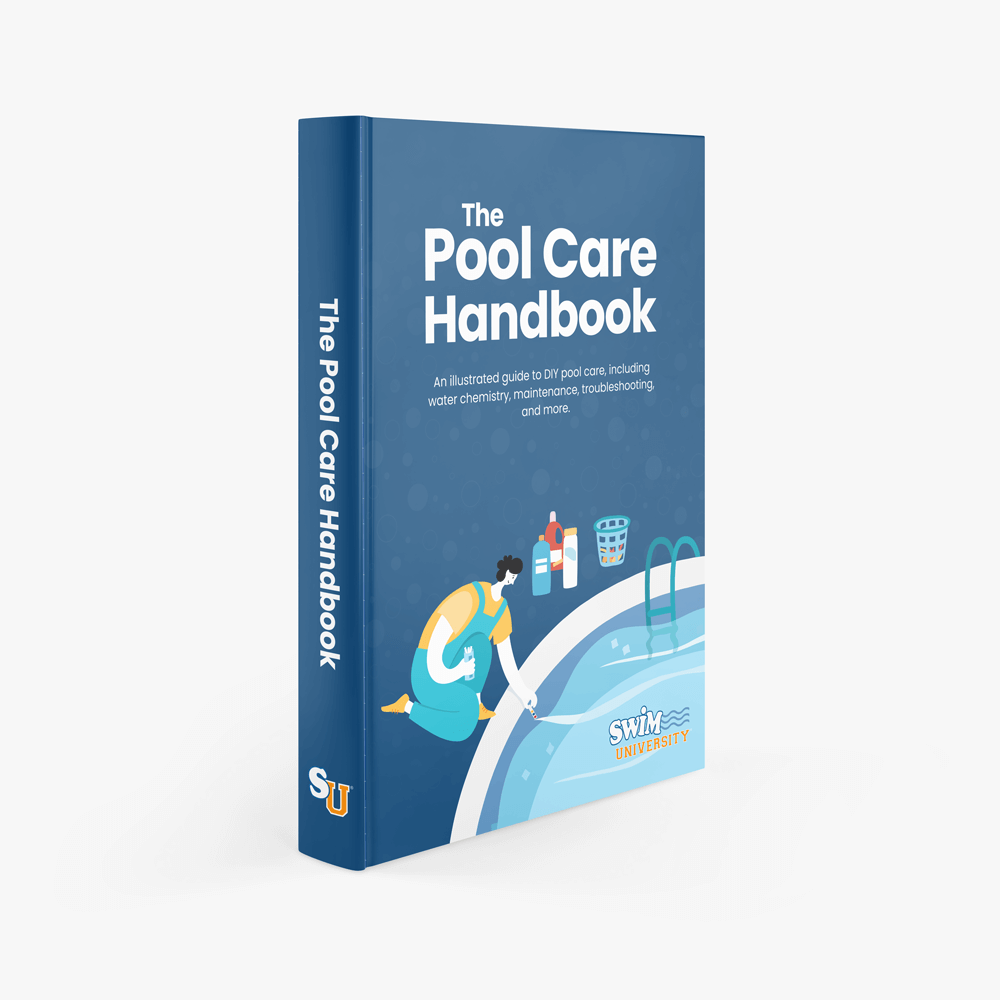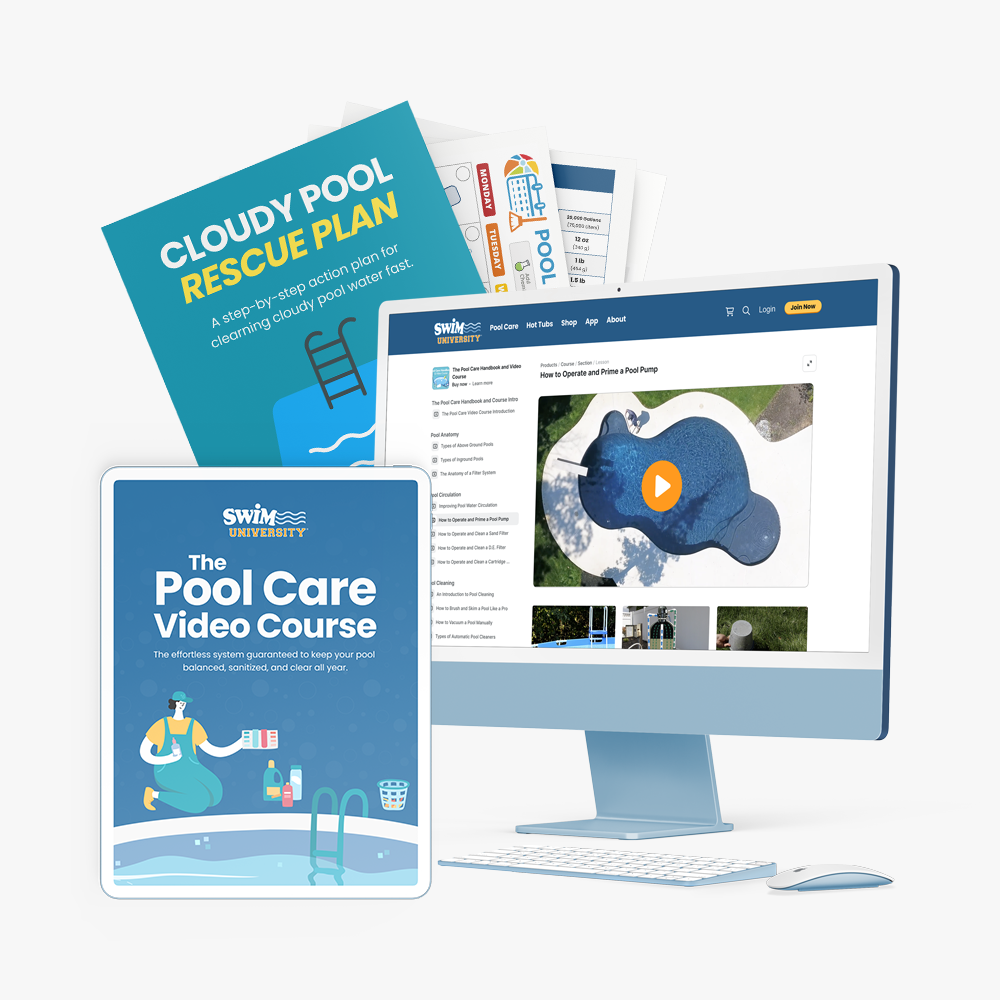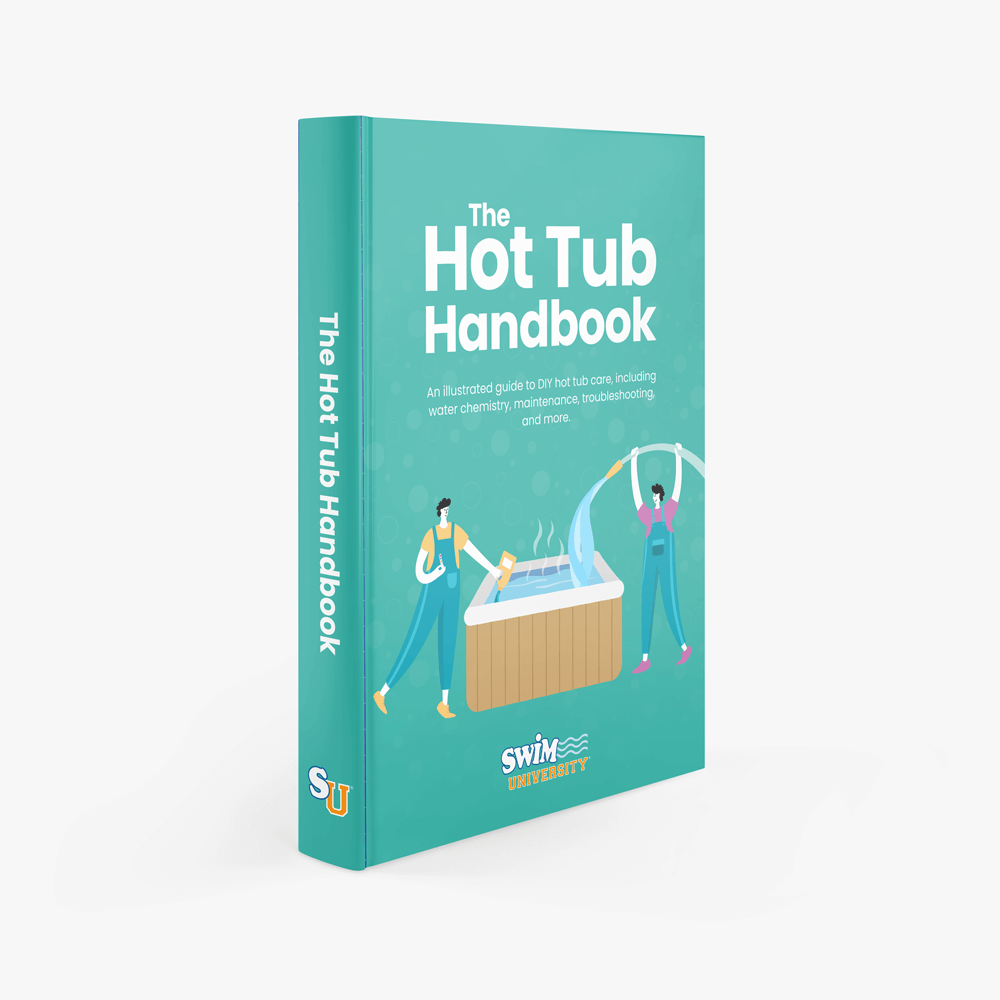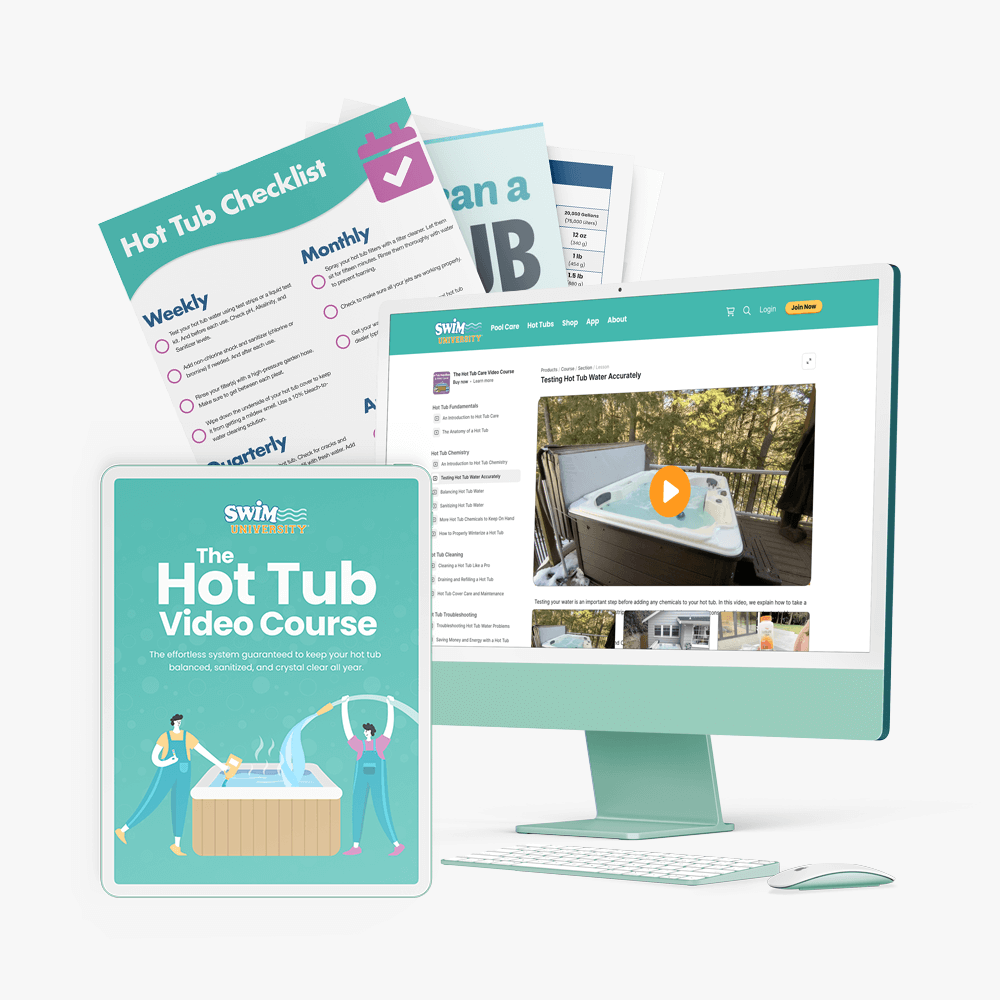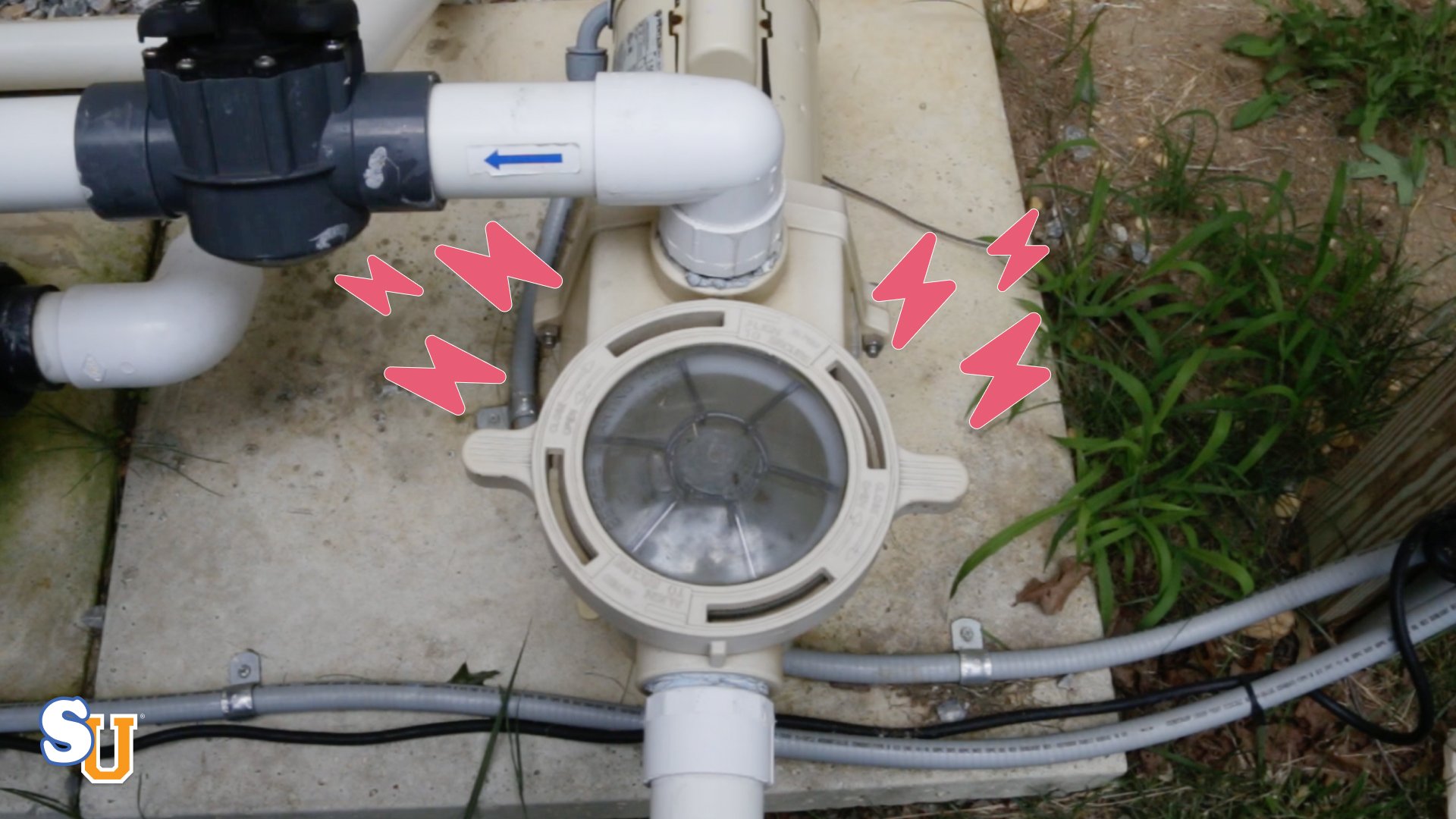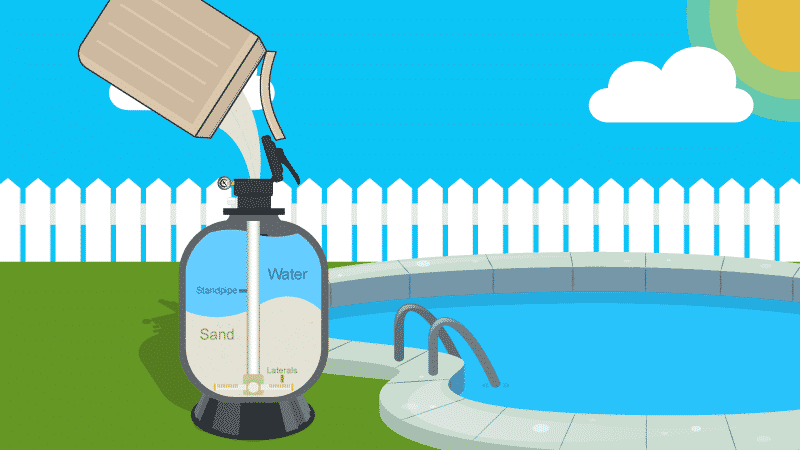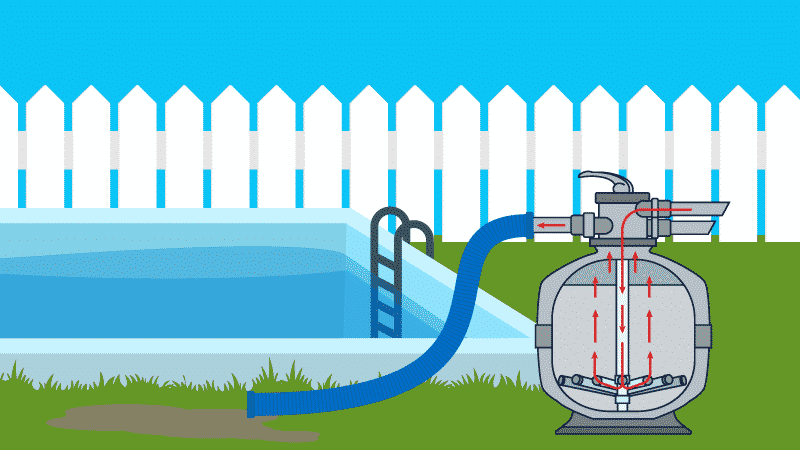How to Clean a Pool Filter (Sand, Cartridge, D.E.)
Your filter is one of the main components in keeping your swimming pool clean. Knowing how to clean a pool filter is an essential part of basic pool maintenance. As long as you have the right equipment and enough time, cleaning your inground or above-ground pool filter will be a snap. Here’s our DIY guide to cleaning any pool filter.
Stop wasting time and money with confusing water chemistry and maintenance. Our effortless system guarantees to keep your pool balanced, sanitized, and crystal clear all year. Works for all pools including saltwater.
Why Type of Pool Filter Do You Have?
Depending on the type of pool filter you have—cartridge, sand, or diatomaceous earth (D.E.)—the proper filter cleaning method will vary. And this guide covers all three. Scroll down to the section that applies to your filter system 👇.
However, if you’re unsure what type of filter system you have, check out our guide on pool filters. It also depends on the brand of filter you have. For example, if you have a Hayward D.E. filter, chances are you’ll be dealing with filter fingers instead of grids which you’ll find in a Pentair filter.
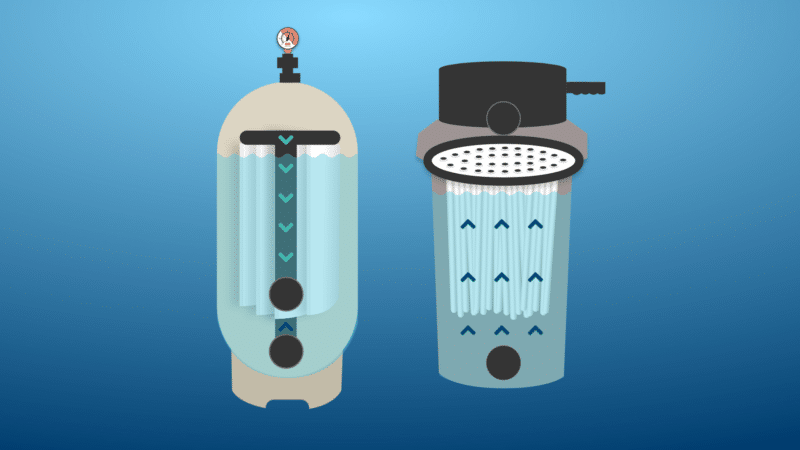
Just make sure you have the proper pool equipment on hand for your type of filter, and then set aside some time to make sure it’s done properly. A dirty filter makes for a dirty pool.
How Often Should You Clean Your Pool Filter?
You should clean your pool filter at least once a month. A good indication that your filter needs to be cleaned is when the pressure gauge reads 10 psi above the normal operating level.
Cloudy water can also be an indicator that the filter needs a good cleaning. And if you’re dealing with cloudy pool water, read our cloudy pool water guide.
But sometimes your filter needs a deep clean. We recommend deep-cleaning your filter at least once a year depending on the type of filter you have.
How to Clean a Cartridge Pool Filter in 4 Easy Steps
This is an easy type of filter to clean because you can simply pull out the pool filter cartridge, clean it, and replace it. You’ll need to follow a few steps to make sure it’s done right.
Once you have all the supplies, set aside some time to clean the pool filter. The process may even extend overnight, depending on how dirty the filter cartridge is.
1. Turn Off The Pump And Depressurize The Filter Tank
First, turn off the pool pump. If you have a timer, make sure you remove anything that’ll trip the timer and turn the pump back on. You don’t want the pump to come back on when you’re cleaning the filter cartridge.
For your own safety, remove air from the system. Turn the air relief valve (usually located on top of the filter) slowly to remove any excess air from the system.
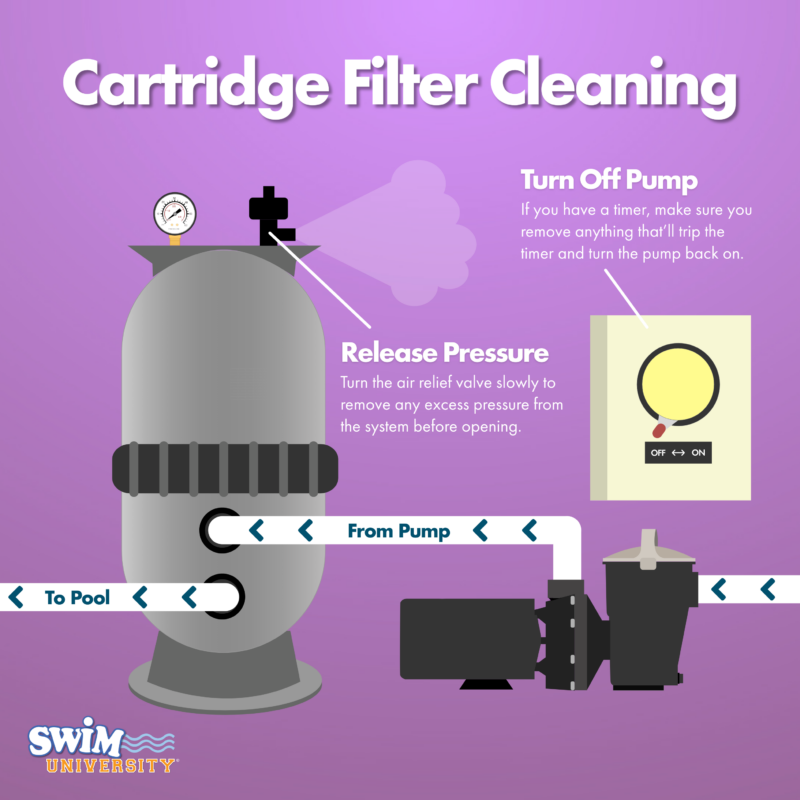
2. Remove The Cartridge Inside The Filter Tank
Remove the clamps (or other latching mechanisms) holding the filter together. If you’re unsure how to open it, check the owner’s manual.
Remove the top of the filter. Then, carefully remove the cartridge and set it aside. Inspect it for damage and wear. If you find any cracks or tears, or it’s past the point where cleaning will be effective, it’s time to get a new filter cartridge to replace it.
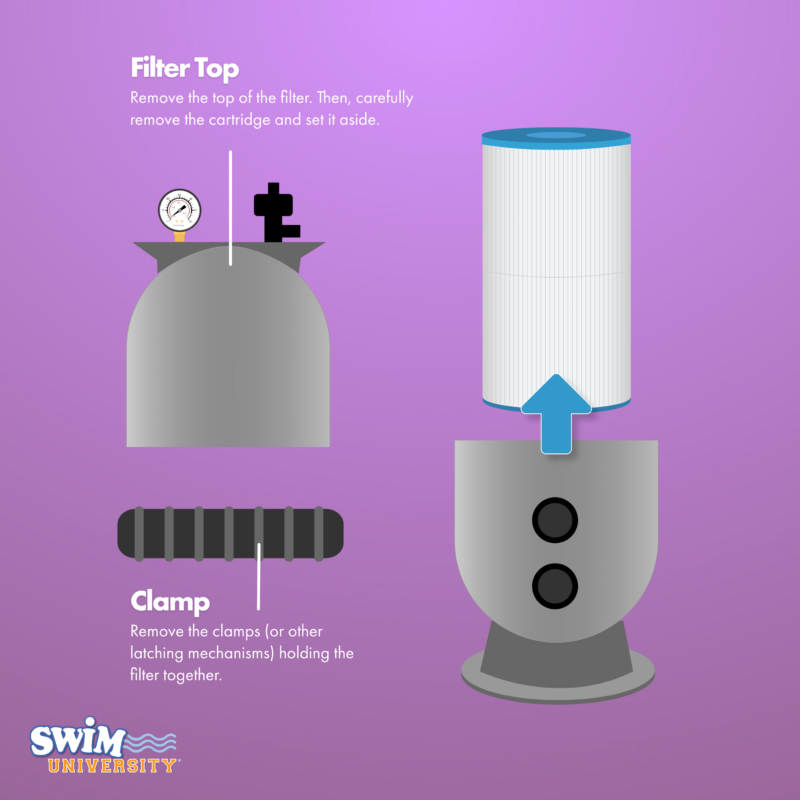
3. Clean The Pool Filter Cartridge
Use a spray nozzle on your garden hose to spray down the cartridge, making sure to get between the pleats. If you want a special spray nozzle built specifically for cleaning pool cartridge filters, click here. Otherwise, a standard garden hose nozzle will work fine.
If the cartridge is dirty, use a filter cartridge cleaner. Follow the manufacturer’s instructions.
A powerful overnight soak that dissolves buildup in any pool filter, helping it work better and making your pool water crystal clear for swimming all summer long.
If it’s been a while since you’ve cleaned the cartridge filter, it can be covered in algae, calcium build-up, sunscreen, iron, and other contaminants you don’t want in your pool. In this case, soak the cartridge in a filter cleaning solution overnight. You can use the same filter cartridge cleaner to do this. Use a 5-gallon bucket, and make sure the cartridge is completely covered with the water and cleaning solution.
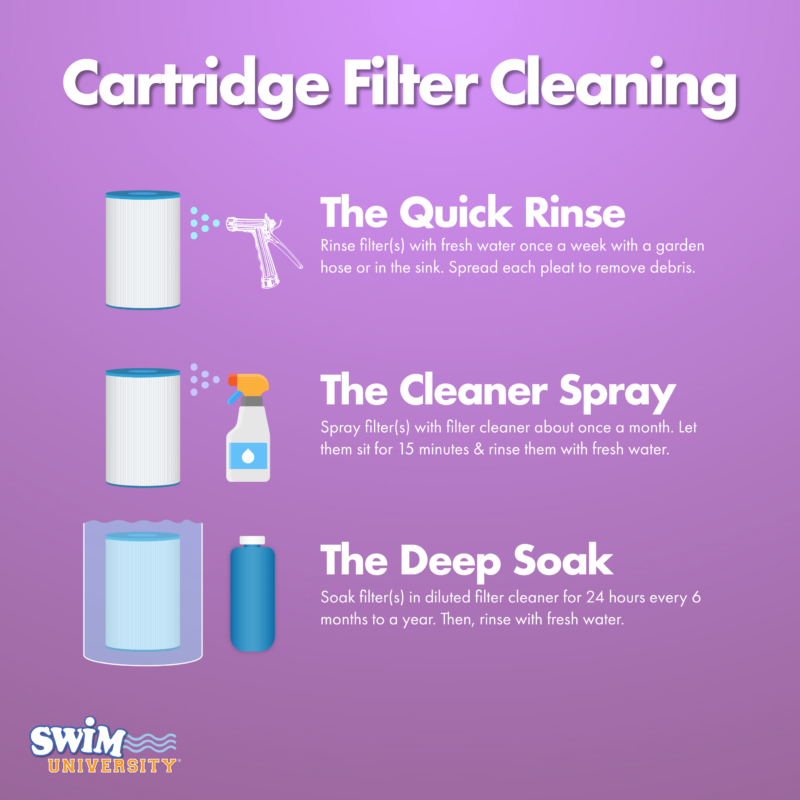
Alternatively, you can dilute one part muriatic acid to 20 parts water in a 5-gallon bucket. Place the filters in the bucket and allow them to soak overnight.
Check the O-ring on the filter tank. If it’s in good shape, lightly apply some lubricant to keep it that way. If it’s dry-rotted or appears worn out, replace it.
Use this stuff liberally on all rubber o-rings to get a tighter seal and it'll make them last longer too!
Rinse the cartridge thoroughly with water before putting it back in the tank.
4. Replace The Filter Cartridge and Re-Pressurize
Return the cartridge to the filter, and secure it in place. Replace the filter top and close the clamps.
Turn the system back on, and open the air relief valve to release any excess air in the system. Keep the valve open until a steady stream of water sprays from it.
Check the pressure gauge to be sure it’s in the normal filter pressure range. If the pounds per square inch (PSI) is off, you may have put the filter back together incorrectly, or something else may be wrong with the system. Troubleshoot the pool filtration system to identify and correct the problem.
How to Clean a Sand Filter in 3 Simple Steps
You can backwash the sand filter, which you’ll need to do whenever it reaches 10 psi over the normal operating level. It may also be time to clean the filter if you start to notice cloudy pool water.
But at least once a year, you need to chemically clean your sand filter.
1. Backwash The Sand Filter
First, turn off the pump and move the handle on your multiport valve to “Backwash.” Attach your backwash hose to the waste port and turn the pump back on. Backwashing should take 1-2 minutes or until the water looks clear.
If you need more help backwashing your filter, check out our complete guide on backwashing here.
2. Add Filter Cleaning Solution
Turn off the pump, and turn the valve to “Filter.” Remove the pump’s strainer lid and our sand filter cleaner into the strainer basket. Then, replace the pump lid.
Turn the pump on for about 15 seconds, just long enough to transfer the cleaner from the pump to the filter. Turn off the pump, and leave it off for at least 8 hours, or overnight.
3. Backwash The Filter Again
Backwash the filter for 3 to 5 minutes again to remove the build-up of dirt and debris dislodged by the filter cleaner. Turn the filter system back on.
If you don’t already have a sand filter, you may want to consider investing in one. The time you’ll save in cleaning is time you can spend enjoying your pool.
How to Clean a D.E. Pool Filter in 5 Steps
You can chemically clean a D.E. filter or you can backwash a D.E. filter. Aside from those indicators, it’s a good idea to clean your D.E. filter at least once a month. And if you need more information on D.E. filters, check out our full guide here.
1. Backwash and Drain The D.E. Filter
First, turn off the pump and move the handle on your multiport valve to “Backwash.” If you have a push/pull valve, make sure it’s in the backwash position.
Attach your backwash hose to the waste port and turn the pump back on. Backwashing should take 1-2 minutes or until the water looks clear. If you need more help backwashing your DE filter, click here for our complete guide.
Then, turn the pump off and open the air relief valve. Finally, remove the drain plug, and let the water drain out of the filter tank.
2. Remove DE Filter Manifold
Remove the clamps (or other latching mechanisms) holding the filter together. If you’re unsure how to open it, check the owner’s manual.
Open the filter tank and remove the filter manifold, and take out all the grids or fingers.
3. Rinse and/or Soak Filter Grids or Fingers
Use a spray nozzle on your garden hose to spray down the manifold and grids/fingers, making sure to thoroughly flush all debris including the D.E. powder. If the manifold is really dirty, use a D.E. filter cleaner. Follow the manufacturer’s instructions.
If the manifold is really dirty, you may want to soak it overnight in a muriatic acid solution.
Important: The acid in muriatic acid is exactly that. It’s caustic, and can cause injury if you’re not careful. Take all the precautions necessary to protect yourself, and anyone else who may be around while you’re cleaning your filter. We recommend using this method if your filter is so filthy that regular filter cleaner isn’t enough. And if you use this method, do so sparingly.
Put on the safety goggles and acid-resistant gloves. We also recommend you wear long sleeves, pants, and closed shoes. Dilute one part muriatic acid to 20 parts water in a large, plastic trash can with a lid can big enough to hold the acid solution and filter manifold. Place the manifold in the trash can, ensuring it’s completely covered with the diluted solution. Allow it to soak overnight.
Used for lowering alkalinity and pH in your pool water. It's also used for cleaning pool filter grids, filter cartridges, and concrete pool surfaces.
4. Put The Filter Back Together
Once the complete filter manifold is clean, rinse out the tank with the garden hose, and place it back into the filter tank.
Replace the clamps (or other latching mechanisms) holding the filter together. If you’re unsure how to close it, check the owner’s manual.
5. Add Fresh D.E. Powder
Refer to your filter owner’s manual to determine how much D.E. powder you’ll need to add. Mix the appropriate amount of D.E powder with enough water to make a slurry, which is a thin, creamy solution.
Make sure the pump is running, and pour the slurry directly into the pool skimmer. Then, run the pool pump for at least 30 minutes to allow the D.E. to distribute evenly over the filter grids or fingers.
Filter media for backwashing and cleaning D.E. pool filters.
Frequently Asked Questions About Cleaning a Pool Filter
Keeping your filter clean will also help it run longer and more efficiently, saving you money, energy, and time. The longer you keep your filter in good working condition, the longer you can wait to replace it, and the more you can focus on enjoying your pool.
Can you use vinegar to clean a pool filter?
Yes, but only a cartridge filter (not sand or D.E.). Soak your pool cartridge filters in a 50/50 split of water and white distilled vinegar (do not use white wine vinegar). Allow the filters to soak for at least 3 hours and up to 8 hours.
Can I soak my pool filter in bleach?
No. Bleach will damage the fibers of pool filter cartridges. You’re better off using a filter cartridge cleaner or a 50/50 split of water and white distilled vinegar (do not use white wine vinegar).
Can I use a pressure washer to clean pool filters?
No. A pressure washer is too powerful and will damage your filters. Your best bet is to soak your filters in a filter cleaning solution (specifically designed for pools) for at least 3 hours and up to 8 hours (overnight).
How long do pool filters last?
If you take good care of your pool cartridge filters by cleaning them regularly, they can last 2-3 years. If you have a sand filter, the sand inside will last about 3-5 years.
How do you clean algae out of a pool filter cartridge?
If your cartridge filter is covered in algae, soak the cartridge in a filter-cleaning solution overnight. Use a 5-gallon bucket, and make sure the cartridge is completely covered with the water and cleaning solution. Alternatively, you can dilute one part of muriatic acid to 20 parts of water.
3 Ways We Can Help With Your Pool
- Pool Care Cheat Sheets (Free): Easy-to-use downloadable guides to help you keep track of taking care of your pool this year.
- The Pool Care Handbook: An illustrated guide to DIY pool care, including water chemistry, maintenance, troubleshooting, and more.
- The Pool Care Video Course: You’ll get 30+ step-by-step videos and a downloadable guide with everything you need to know about pool maintenance.







